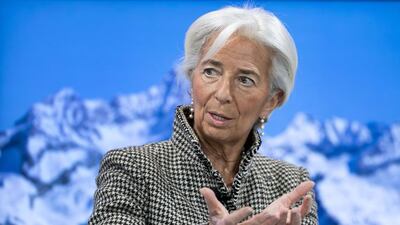The Middle East continues to face economic challenges a decade after the global financial crisis – particularly for oil importing countries – and governments must strengthen fiscal policies to drive growth, the International Monetary Fund’s managing director Christine Lagarde said.
“The economic path ahead for the region is challenging,” Ms Lagarde told the Arab Fiscal Forum in Dubai on Saturday. “This makes the task of fiscal policy that much harder, which in turn makes it even more important to build strong foundations to anchor fiscal policy.”
Ms Lagarde outlined two pillars of good fiscal management – strong fiscal frameworks, and good governance and transparency – to enable sustainable economic growth against the backdrop of a challenging global outlook.
The IMF in January cut its global growth forecasts on trade uncertainty and other downside risks, and now projects global gross domestic product to rise by 3.5 per cent in 2019 and 3.6 per cent in 2020 – 0.2 and 0.1 percentage points below its last projections in October.
The weaker global environment has impacted Middle East and North African economies, as knock-on effects are felt on trade, remittances, capital flows, commodity prices and overall financing conditions.
Among Mena oil importers such as Lebanon and Jordan, growth has picked up but is still below pre-crisis levels, Ms Lagarde said. Fiscal deficits remain high, and average public debt has risen to 85 percent of GDP, from 64 per cent in 2008. Public debt exceeds 90 per cent of GDP in nearly half of these countries.
Meanwhile, oil exporters continue to see “modest” growth, but they have still not fully recovered from the oil price downturn of 2014 and the outlook remains uncertain, Ms Lagarde added. Mena oil exporters, including the UAE, Saudi Arabia, Kuwait, and others, need to shift rapidly towards renewable energy over the next few decades to reduce dependence on oil revenues and lower the cost of domestic energy provision, she said.
Average public debt for Mena oil exporting economies has risen to 33 per cent of GDP in 2018, from 13 percent in 2013, despite fiscal reforms such as public spending cuts and the introduction of VAT and excise taxes.
Many countries have worked to strengthen their fiscal frameworks in recent years, the managing director noted. For example, countries like Saudi Arabia, Kuwait, the UAE, Sudan, and Lebanon have set up macro-fiscal government units – a “useful first step”.
Others including Bahrain and Algeria have adopted new initiatives to balance budgets in the medium term rather than focusing on short-term goals, while Egypt now produces a fiscal risk statement alongside its budget and an internal budget risk assessment each year.
The UAE is working on a similar fiscal risk project, and intends to produce its first fiscal stress test this year, Ms Lagarde added. The IMF forecasts the UAE's GDP growth to gain momentum in 2019/2020 on higher inward investment, government stimulus and the Expo 2020 Dubai, it said in a report last week.
“But there is scope to improve fiscal frameworks in the region… and create the fiscal space to enable spending on health, education, social protection and public investment – all key priorities in the region,” she said.
The first building block is a good fiscal framework – that is, the laws, institutional arrangements and procedures to achieve a country’s fiscal policy objectives with clear, credible goals.
The second pillar is good governance and transparency – enforced by strong institutions that create legitimacy and generate buy-in among citizens and businesses for incoming fiscal policies. “We know that these kind of reforms pay off,” she said.
Reducing corruption in public institutions is a key strand of building good fiscal frameworks. “This a global issue—relevant for large and small countries, advanced and low-income economies, and the public and private sectors,” Ms Lagarde said.
“Given this, it is no surprise that IMF research found that weak governance and corruption are associated with significantly lower growth, foreign direct investment, tax revenues, and higher inequality and exclusion.”
The IMF has been ramping up its engagement in this field and intends to reach out to Mena leaders this year to discuss how to expand anti-corruption activity in the region.

